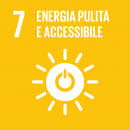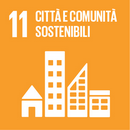From SDGs to practical action: a urban planning implementation investingation – Proff. Caterina Pietra, Roberto De Lotto, Elisabetta Venco
- 09, 06, 2022
The course will focus on SDG11 and SDG7.
Title: From SDG goals to practical actions: a urban planning implementation investigation
Provider: University of Pavia, Proff. Caterina Pietra, Roberto De Lotto, Elisabetta Venco.
Date: November – December 2024
PROGRAM
L1: Goal 11 and best practices – 2 hours – Caterina Pietra
L2: Nature-based Solutions (NBS) in urban and architectural practice – 2 hours – Roberto De Lotto
L3: Sustainable Energy Communities – 2 hours – Elisabetta Venco
L4: Founding principles and aims of the Healthy City – 2 hours – Caterina Pietra
L5: Organizational structure of the Healthy City – 4 hours – Caterina Pietra
L6: Healthy City ontology – 4 hours – Caterina Pietra
Examination dates: to be defined
The examination will be available on Kiro. It will be realized via Kiro Testing, as a multiple choice questionnaire.
Important Note: remind to register to the exam via ESSE3. It is necessary to make sure your vote is correclty registered and the Open badge correctly issued.
Description of the course:
The course aims to provide students with a multidisciplinary and
proactive vision capable of focusing attention on the effective
implementation of sustainable policies and awareness of current
challenges concerning the urban field through targeted planning and
design activities.
The inclusive, safe, resilient, and sustainable components of SDG 11 will
constitute the main course’s focus and will be specified by introducing
and explaining additional subtopics. The fundamental relation between
local government’s decision models and communities’ initiatives will be
described to highlight the current necessity for empowerment and
participation. One valid example of this relationship will be proposed
through the description of the so-called energy-island communities where
both private people and organizations can cooperate in order to improve
the local energy infrastructure. In addition to this, the concept of Healthy
City will be introduced, as well, to define strong connections with health
as an essential precondition to make cities sustainable.
Learning outcomes:
- The main features of SDG 11: the first stand-alone urban goal;
- The relationship between sustainable objectives, strategies, policies and their implementation phases (including organizational, juridical, technical and sometime psychological aspects);
- Methodologies and tools useful to describe cities’ complexity;
- The role of governments and communities related to different kind of organizational structures (Energy islands, Healthy City).
How: in streaming on line
Credits: 2 (16 hours)
Time period: First semester 2024, October – November
October
Monday 14th, Tuesday 15th: h 2.00-4.00 pm
Monday 21st, Friday 25th: h 2.00-4.00 pm
Monday 28th, Tuesday 29th: h 2.00-4.00 pm
November
Monday 4th, Tuesday 5th: h 2.00-4.00 pm
Any prerequisites: No particular prerequisites are required to attend the course. However, a
certain interest is hoped for in the general themes of urban planning, urban health, and sustainability.
Learning resources: Slides and scientific papers.
Type of assessment: Multiple-choice questionnaire.
Quality assurance: University of Pavia.


